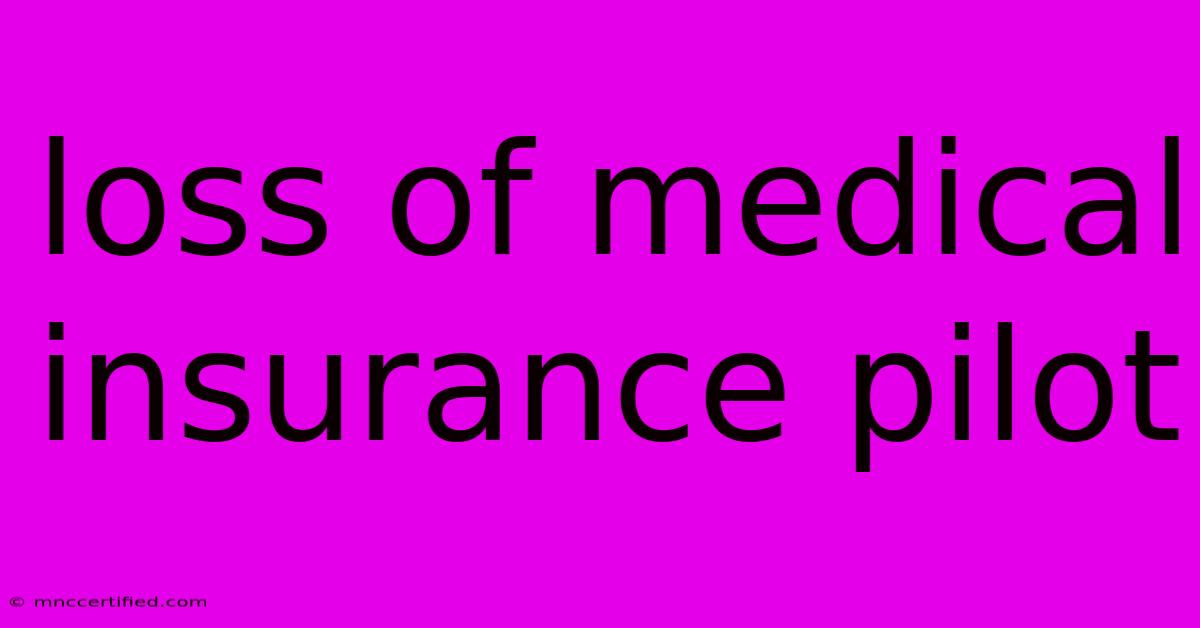Loss Of Medical Insurance Pilot

Table of Contents
Navigating the Loss of Medical Insurance: A Pilot Program's Potential
Losing health insurance can be a terrifying experience, leaving individuals and families vulnerable to crippling medical debt. The financial burden and anxiety surrounding healthcare access are significant concerns, prompting exploration of innovative solutions. One such approach is the development of loss of medical insurance pilot programs. These programs aim to test and refine strategies to mitigate the negative impacts of insurance loss, paving the way for broader implementation of effective support systems. This article will delve into the complexities of these pilot programs, exploring their goals, challenges, and potential impact on healthcare accessibility.
Understanding the Scope of the Problem
Before diving into pilot programs, it's crucial to understand the sheer scale of the issue. Millions of Americans experience gaps in their health insurance coverage each year, often due to job loss, changes in family status, or unaffordability of premiums. This lack of coverage directly correlates to delayed or forgone medical care, leading to:
- Increased healthcare costs: Uninsured individuals often delay treatment until conditions worsen, requiring more expensive interventions.
- Poor health outcomes: Lack of preventative care and timely treatment contributes to higher rates of chronic illness and mortality.
- Financial instability: Medical bills can quickly overwhelm household budgets, pushing families into poverty.
The Role of Loss of Medical Insurance Pilot Programs
Pilot programs offer a controlled environment to test the effectiveness of various interventions aimed at reducing the negative consequences of losing health insurance. These programs often involve:
- Targeted outreach and enrollment assistance: Connecting individuals with available healthcare resources, including Medicaid, CHIP, and the Affordable Care Act (ACA) marketplaces. This often includes assistance with navigating complex application processes.
- Financial assistance programs: Providing subsidies or direct financial aid to help individuals afford healthcare services.
- Care coordination and navigation: Guiding individuals through the healthcare system, helping them access appropriate care and avoid unnecessary expenses.
- Health education and preventative care initiatives: Promoting healthy lifestyles and early detection of health problems.
Key Challenges in Implementing Effective Pilot Programs
While the intent is laudable, several hurdles exist in successfully executing these programs:
- Data collection and analysis: Accurately measuring the impact of interventions requires robust data collection and sophisticated analysis. This can be challenging, especially when working with vulnerable populations.
- Reaching underserved communities: Effective outreach strategies are crucial to reach those most in need, including individuals with language barriers, limited digital literacy, or geographical limitations.
- Sustainability and scalability: Successful pilot programs must demonstrate long-term sustainability and potential for broader implementation across different communities and healthcare systems.
- Political and regulatory hurdles: Changes in healthcare policy and funding can impact the viability and scope of these programs.
Examples of Successful Strategies within Pilot Programs
While specific details of individual pilot programs are often confidential due to ongoing research, successful strategies frequently incorporate:
- Community partnerships: Collaborations between healthcare providers, social service organizations, and community leaders are essential for effective outreach and resource allocation.
- Technology integration: Utilizing telehealth platforms and online resources can improve access to care, particularly in remote areas.
- Person-centered care: Tailoring interventions to the individual needs and circumstances of participants is critical for maximizing impact.
The Future of Loss of Medical Insurance Pilot Programs
The success of these pilot programs will have significant implications for shaping future healthcare policies and improving access to care. By identifying effective strategies and overcoming challenges, these programs hold the potential to significantly reduce the negative impact of losing health insurance. Continued research, evaluation, and dissemination of best practices are vital to improving the lives of millions. The ultimate goal is to ensure that everyone has access to the quality healthcare they need, regardless of their insurance status. Further research into innovative solutions such as universal healthcare, single-payer systems, and public health initiatives is vital to achieving this crucial goal.

Thank you for visiting our website wich cover about Loss Of Medical Insurance Pilot. We hope the information provided has been useful to you. Feel free to contact us if you have any questions or need further assistance. See you next time and dont miss to bookmark.
Featured Posts
-
Credit Life Insurance Age Limit
Nov 26, 2024
-
Hannah Kobayashi Missing Latest Maui News
Nov 26, 2024
-
Insurance No Loss Letter Sample
Nov 26, 2024
-
Happy Thanksgiving Voice Of The Valley
Nov 26, 2024
-
How To Buy Lana Del Rey Uk Tour Tickets
Nov 26, 2024